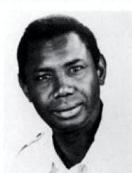Massa Makan Diabaté facts for kids
Massa Makan Diabaté (born June 12, 1938 – died January 27, 1988) was an important writer, historian, and playwright from Mali. He was known for his stories and plays.
Contents
Life and Education
Massa Makan Diabaté was born in 1938 in a town called Kita in Mali. He came from a long family line of West African storytellers and poets, known as griots. Griots are very important people in West African culture. They keep history alive by telling stories, singing songs, and sharing traditions.
Massa Makan Diabaté's uncle, Kélé Monson Diabaté, was a very respected master griot. Massa Makan Diabaté started learning to be a griot when he was just seven years old. He later said that his uncle taught him a lot.
Even though he was trained as a griot, Diabaté also went to school. He studied in Guinea and later moved to Paris, France. In Paris, he learned about history, how societies work (sociology), and how governments work (political science). After his studies, he worked for big international groups like UNICEF and UNESCO, which help people around the world.
His Return to Mali and Famous Works
After his time abroad, Diabaté returned to Mali. He got a job in the government in Bamako, the capital city.
His first books were French versions of old Malinké stories and poems. These included Janjon et autres chants populaires du Mali (1970) and Kala Jata (1970). In 1971, his book Janjon won a major award called the Grand prix littéraire d'Afrique noire. This award helped him become known around the world.
He also wrote a famous series of three novels: Le lieutenant, Le coiffeur, and Le boucher de Kouta. These books were published between 1979 and 1982. In 1987, this series won another important award, the Grand prix international de la Fondation Léopold Sédar Senghor.
Massa Makan Diabaté passed away in Bamako on January 27, 1988. To honor him, the Malian government named two high schools after him. One is in Bamako, and the other is in his home region of Kayes.
Diabaté's View on Griots
Even though Massa Makan Diabaté was a griot himself, he felt that some griots of his time were not doing their job well. He thought they sometimes changed history or used their important role to get rich. He once said that after Mali became independent, some griots became "parasites," meaning they weren't contributing positively to society.
The role of griots was a very important topic in his books. Diabaté believed that the image of griots could be made better. He saw writing as a way to help achieve this. He wanted to bring back the respect and importance that griots once had. He felt that by writing down stories instead of just telling them, he was helping to improve the tradition.
Fasiya and Fadenya in His Work
Diabaté's family expected him to be a griot, and at first, he followed this path. This idea of following your family's traditions is called Fasiya.
However, Diabaté also wanted to be different and make his own mark. He left the oral tradition (storytelling by speaking) to write books. This desire to be unique and challenge traditions is called Fadenya.
Fadenya can be a good thing because competition and new ideas can lead to creative changes. When Diabaté returned to Mali, his written works became part of the Malian storytelling tradition. By bringing written words to the world of oral storytellers, he helped change how stories were passed down.
This balance between Fasiya (tradition) and Fadenya (new ideas) is a key part of what makes a hero in Malian culture. A great example is the hero of the Epic of Sundiata Keita. Diabaté showed this idea in his own novels.
For example, in his book Le boucher de Kouta (The Butcher of Kouta), the main character sells donkey meat without telling his customers. Eating donkey meat is against some traditional rules. The butcher is breaking tradition. But because of this, the people of Kouta can buy meat that they can afford. Diabaté showed that sometimes, rules need to be bent, and traditions need to change to bring about good things for everyone.
See also
 In Spanish: Massa Makan Diabaté para niños
In Spanish: Massa Makan Diabaté para niños
 | John T. Biggers |
 | Thomas Blackshear |
 | Mark Bradford |
 | Beverly Buchanan |


